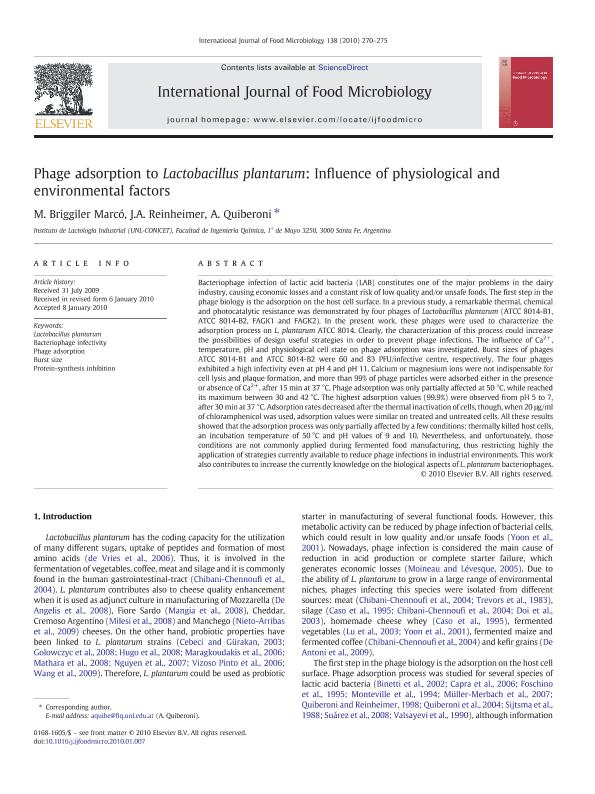Mostrar el registro sencillo del ítem
dc.contributor.author
Briggiler Marcó, Mariángeles

dc.contributor.author
Reinheimer, Jorge Alberto

dc.contributor.author
Quiberoni, Andrea del Lujan

dc.date.available
2020-03-28T20:50:08Z
dc.date.issued
2010-03
dc.identifier.citation
Briggiler Marcó, Mariángeles; Reinheimer, Jorge Alberto; Quiberoni, Andrea del Lujan; Phage adsorption to Lactobacillus plantarum: influence of physiological and environmental factors.; Elsevier Science; International Journal of Food Microbiology; 138; 3; 3-2010; 270-275
dc.identifier.issn
0168-1605
dc.identifier.uri
http://hdl.handle.net/11336/101214
dc.description.abstract
Bacteriophage infection of lactic acid bacteria (LAB) constitutes one of the major problems in the dairy industry, causing economic losses and a constant risk of low quality and/or unsafe foods. The first step in the phage biology is the adsorption on the host cell surface. In a previous study, a remarkable thermal, chemical and photocatalytic resistance was demonstrated by four phages of Lactobacillus plantarum (ATCC 8014-B1, ATCC 8014-B2, FAGK1 and FAGK2). In the present work, these phages were used to characterize the adsorption process on L. plantarum ATCC 8014. Clearly, the characterization of this process could increase the possibilities of design useful strategies in order to prevent phage infections. The influence of Ca(2+), temperature, pH and physiological cell state on phage adsorption was investigated. Burst sizes of phages ATCC 8014-B1 and ATCC 8014-B2 were 60 and 83 PFU/infective centre, respectively. The four phages exhibited a high infectivity even at pH 4 and pH 11. Calcium or magnesium ions were not indispensable for cell lysis and plaque formation, and more than 99% of phage particles were adsorbed either in the presence or absence of Ca(2+), after 15 min at 37 degrees C. Phage adsorption was only partially affected at 50 degrees C, while reached its maximum between 30 and 42 degrees C. The highest adsorption values (99.9%) were observed from pH 5 to 7, after 30 min at 37 degrees C. Adsorption rates decreased after the thermal inactivation of cells, though, when 20 microg/ml of chloramphenicol was used, adsorption values were similar on treated and untreated cells. All these results showed that the adsorption process was only partially affected by a few conditions: thermally killed host cells, an incubation temperature of 50 degrees C and pH values of 9 and 10. Nevertheless, and unfortunately, those conditions are not commonly applied during fermented food manufacturing, thus restricting highly the application of strategies currently available to reduce phage infections in industrial environments. This work also contributes to increase the currently knowledge on the biological aspects of L. plantarum bacteriophages.
dc.format
application/pdf
dc.language.iso
eng
dc.publisher
Elsevier Science

dc.rights
info:eu-repo/semantics/openAccess
dc.rights.uri
https://creativecommons.org/licenses/by-nc-sa/2.5/ar/
dc.subject
Lactobacillus plantarum
dc.subject
BACTERIOPHAGE INFECTIVITY
dc.subject
PHAGE ADSORPTION
dc.subject
BURST SIZE
dc.subject
PROTEIN-SYNTHESIS INHIBITION
dc.subject.classification
Alimentos y Bebidas

dc.subject.classification
Otras Ingenierías y Tecnologías

dc.subject.classification
INGENIERÍAS Y TECNOLOGÍAS

dc.title
Phage adsorption to Lactobacillus plantarum: influence of physiological and environmental factors.
dc.type
info:eu-repo/semantics/article
dc.type
info:ar-repo/semantics/artículo
dc.type
info:eu-repo/semantics/publishedVersion
dc.date.updated
2020-03-27T13:42:17Z
dc.journal.volume
138
dc.journal.number
3
dc.journal.pagination
270-275
dc.journal.pais
Estados Unidos

dc.journal.ciudad
New York
dc.description.fil
Fil: Briggiler Marcó, Mariángeles. Consejo Nacional de Investigaciones Científicas y Técnicas. Centro Científico Tecnológico Conicet - Santa Fe. Instituto de Lactología Industrial. Universidad Nacional del Litoral. Facultad de Ingeniería Química. Instituto de Lactología Industrial; Argentina
dc.description.fil
Fil: Reinheimer, Jorge Alberto. Consejo Nacional de Investigaciones Científicas y Técnicas. Centro Científico Tecnológico Conicet - Santa Fe. Instituto de Lactología Industrial. Universidad Nacional del Litoral. Facultad de Ingeniería Química. Instituto de Lactología Industrial; Argentina
dc.description.fil
Fil: Quiberoni, Andrea del Lujan. Consejo Nacional de Investigaciones Científicas y Técnicas. Centro Científico Tecnológico Conicet - Santa Fe. Instituto de Lactología Industrial. Universidad Nacional del Litoral. Facultad de Ingeniería Química. Instituto de Lactología Industrial; Argentina
dc.journal.title
International Journal of Food Microbiology

dc.relation.alternativeid
info:eu-repo/semantics/altIdentifier/doi/http://dx.doi.org/10.1016/j.ijfoodmicro.2010.01.007
Archivos asociados
